- Resource recovery
- Fertiliser, soil conditioner, production of crops
- Urine reuse or infiltration
- Reply: Human urine fertiliser as a business in Malawi.
Reply: Human urine fertiliser as a business in Malawi.
20.6k views
Dear Elisabeth
Of course the application rate must respect the biological capacity of the soil and plants to absorb nutrients.
Under a large tree, the absorption capacity is better than on bare ground beacuse there is humus, deep roots and plant activity all year round.
I chose conifers precisely for their fall and winter photosynthesis activity.
In addition, with this proposed "home use " method there is no massive application by machine but just 1.5 liters per day applied on alternate areas by hand.
In my web page I state : "Of course, the application of fertilizer or urine must remain moderate. For urine, for information, do not exceed about 5 liters per m² per year or exceed 5% of the total watering to avoid a concentration of salt in the soil".
solar-dripper.com/comment-utiliser-urine-sous-les-arbres/ ( in french)
And when I refered to millions years before there was no intensive farming and no pig manure spread by machines on bare ground.
There may be a confusion.
The maximul rate of 5 liters / m² / year under trees seems realistic and based on manure application rate .
I calculated a required tree surface of 100 m² per person.
At the moment, after 6 months the urine rate is 1.4 L / m² in our test.
The average nitrogen level in the urine is around 0.6 % according to Renaud De Looze book: Urin - Flüssiges Gold Für den Garten - page 9.
I totally agree that there is an application limit and I have never suggested unlimited rate.
But the result with an adequate rate can combine both healthier plants and preserved soil.
And this method reduces urine and nitrogen in rivers where it has nothing to do.
Does that reassure you?
Robert
Of course the application rate must respect the biological capacity of the soil and plants to absorb nutrients.
Under a large tree, the absorption capacity is better than on bare ground beacuse there is humus, deep roots and plant activity all year round.
I chose conifers precisely for their fall and winter photosynthesis activity.
In addition, with this proposed "home use " method there is no massive application by machine but just 1.5 liters per day applied on alternate areas by hand.
In my web page I state : "Of course, the application of fertilizer or urine must remain moderate. For urine, for information, do not exceed about 5 liters per m² per year or exceed 5% of the total watering to avoid a concentration of salt in the soil".
solar-dripper.com/comment-utiliser-urine-sous-les-arbres/ ( in french)
And when I refered to millions years before there was no intensive farming and no pig manure spread by machines on bare ground.
There may be a confusion.
The maximul rate of 5 liters / m² / year under trees seems realistic and based on manure application rate .
I calculated a required tree surface of 100 m² per person.
At the moment, after 6 months the urine rate is 1.4 L / m² in our test.
The average nitrogen level in the urine is around 0.6 % according to Renaud De Looze book: Urin - Flüssiges Gold Für den Garten - page 9.
I totally agree that there is an application limit and I have never suggested unlimited rate.
But the result with an adequate rate can combine both healthier plants and preserved soil.
And this method reduces urine and nitrogen in rivers where it has nothing to do.
Does that reassure you?
Robert
Robert Cossette
solar-dripper.com
solar-dripper.com
Attachments:
-
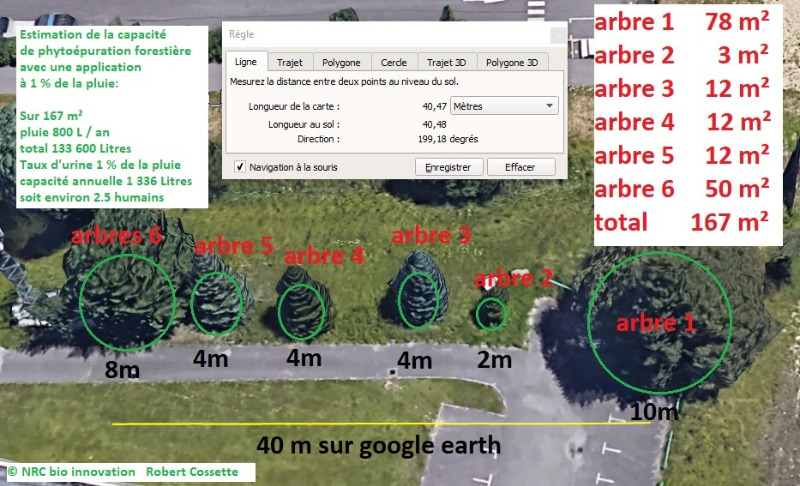 calcul-1-p...2-18.jpg
(Filesize: 168KB)
calcul-1-p...2-18.jpg
(Filesize: 168KB)
Please Log in to join the conversation.
You need to login to reply- Elisabeth
-
- User is blocked
- Freelance consultant since 2012
Less- Posts: 3372
- Karma: 54
- Likes received: 932
Re: Reply: Human urine fertiliser as a business in Malawi.
Hi Robert,
You wrote: "Regarding the long-term effect on the groundwater, I believe that the groundwater quality has held up well for millions of years with the natural transformation of excrement by the soil."
I don't think this is a valid statement in this context. You do know of the problems with nitrate in groundwater resulting from excessive use of manure as a fertiliser in agriculture in Europe, e.g. Germany and the Netherlands? There are now strict rules in place how much manure can be applied, and even how many animals a farmer can keep compared to the amount of land they have available to spread the manure.
Don't get me wrong: I know that urine is a good fertiliser for plants that require nitrogen (in particular) so have no problems with using urine as a fertiliser. But it would be wrong to say that one can never pollute the groundwater of one's garden or agriculatural field with too much urine. You need to follow the respective guidelines. See e.g. here in the SuSanA library:
www.susana.org/en/knowledge-hub/resource...l_8%5B73%5D=73&test=
Here in the SuSanA discussion forum, sub-category on groundwater pollution:
forum.susana.org/193-groundwater-polluti...king-water-treatment
The Wikipedia article on groundwater pollution is also pretty good:
en.wikipedia.org/wiki/Groundwater_pollution
This is important because in many countries people rely on their local groundwater as a source of drinking water. If you were to spread the message that "you can apply as much urine as you want on your soil" then this could result in people polluting their own drinking water source unknowingly. This would be dangerous.
Regards,
Elisabeth
You wrote: "Regarding the long-term effect on the groundwater, I believe that the groundwater quality has held up well for millions of years with the natural transformation of excrement by the soil."
I don't think this is a valid statement in this context. You do know of the problems with nitrate in groundwater resulting from excessive use of manure as a fertiliser in agriculture in Europe, e.g. Germany and the Netherlands? There are now strict rules in place how much manure can be applied, and even how many animals a farmer can keep compared to the amount of land they have available to spread the manure.
Don't get me wrong: I know that urine is a good fertiliser for plants that require nitrogen (in particular) so have no problems with using urine as a fertiliser. But it would be wrong to say that one can never pollute the groundwater of one's garden or agriculatural field with too much urine. You need to follow the respective guidelines. See e.g. here in the SuSanA library:
www.susana.org/en/knowledge-hub/resource...l_8%5B73%5D=73&test=
Here in the SuSanA discussion forum, sub-category on groundwater pollution:
forum.susana.org/193-groundwater-polluti...king-water-treatment
The Wikipedia article on groundwater pollution is also pretty good:
en.wikipedia.org/wiki/Groundwater_pollution
This is important because in many countries people rely on their local groundwater as a source of drinking water. If you were to spread the message that "you can apply as much urine as you want on your soil" then this could result in people polluting their own drinking water source unknowingly. This would be dangerous.
Regards,
Elisabeth
Dr. Elisabeth von Muench
Freelance consultant on environmental and climate projects
Freelance consultant on environmental and climate projects
Please Log in to join the conversation.
You need to login to reply
This Saturday I made a weight measurement of a few terminal branches and the result is excellent.
After 6 months the growth is visibly increased, the trees are magnificent (greener and more silky), there is no smell.
I am at an application rate of 1.4 L / m² to date with a daily application of 1 to 1.4 L / day from one tree to another.
In the fall here there is a lot of rain and I did not dilute it because it was not necessary.
The result is an increase in photosynthesis with more CO2 absorbed and oxygen emitted.
I also saved m3 of water and protected the rivers.
It takes 3 minutes per day.
And you ? what did you do with your urine?
Info ( in French ) solar-dripper.com/comment-utiliser-urine-sous-les-arbres/
In english : solar-dripper.com/en/how-to-use-urine-fertilizer/
After 6 months the growth is visibly increased, the trees are magnificent (greener and more silky), there is no smell.
I am at an application rate of 1.4 L / m² to date with a daily application of 1 to 1.4 L / day from one tree to another.
In the fall here there is a lot of rain and I did not dilute it because it was not necessary.
The result is an increase in photosynthesis with more CO2 absorbed and oxygen emitted.
I also saved m3 of water and protected the rivers.
It takes 3 minutes per day.
And you ? what did you do with your urine?
Info ( in French ) solar-dripper.com/comment-utiliser-urine-sous-les-arbres/
In english : solar-dripper.com/en/how-to-use-urine-fertilizer/
Robert Cossette
solar-dripper.com
solar-dripper.com
Attachments:
-
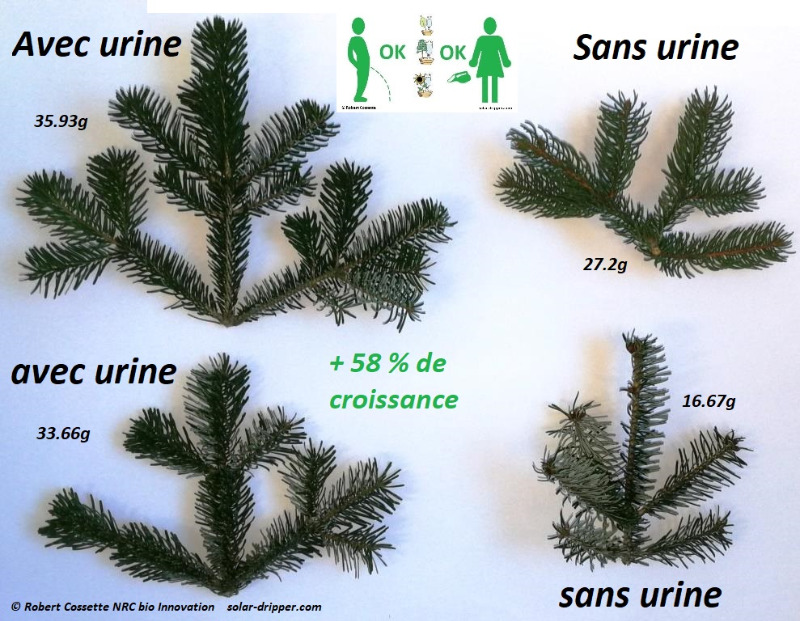 comparatif...rine.jpg
(Filesize: 188KB)
comparatif...rine.jpg
(Filesize: 188KB)
-
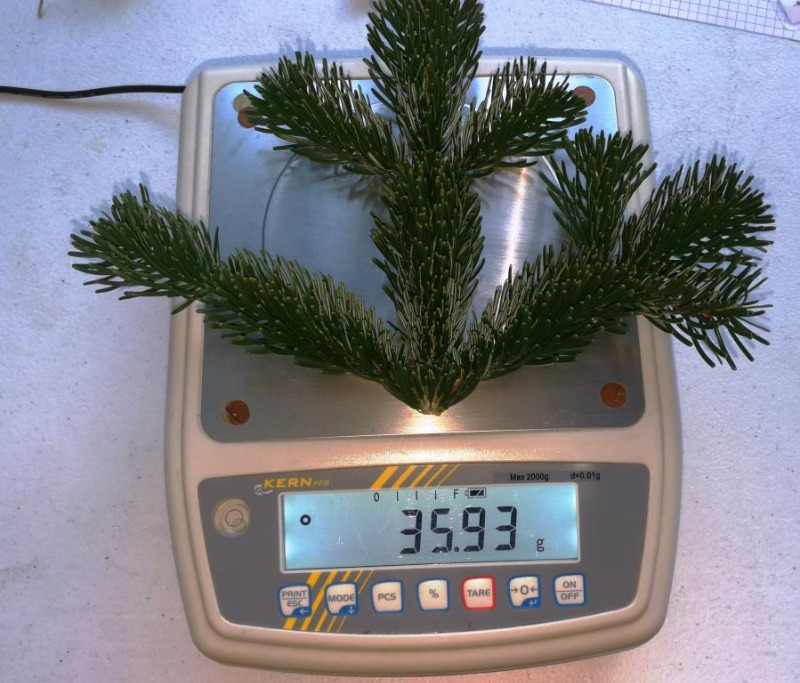 mesure.jpg
(Filesize: 180KB)
mesure.jpg
(Filesize: 180KB)
-
 vipee-unde...2-17.jpg
(Filesize: 193KB)
vipee-unde...2-17.jpg
(Filesize: 193KB)
-
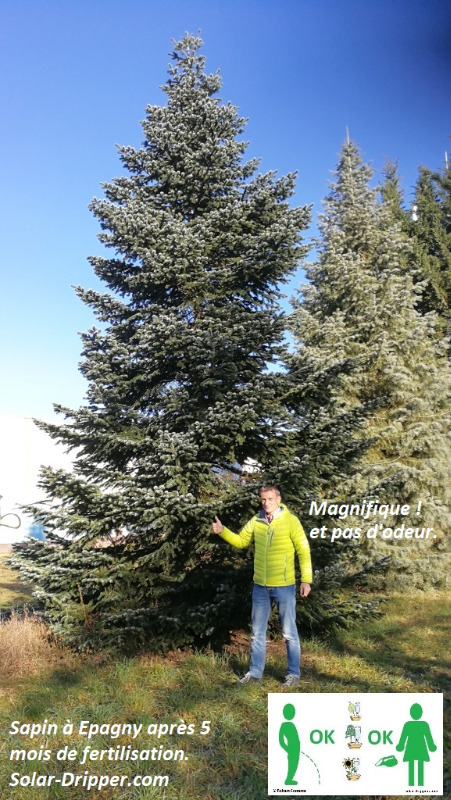 sapin-8-16...2-17.jpg
(Filesize: 201KB)
sapin-8-16...2-17.jpg
(Filesize: 201KB)
-
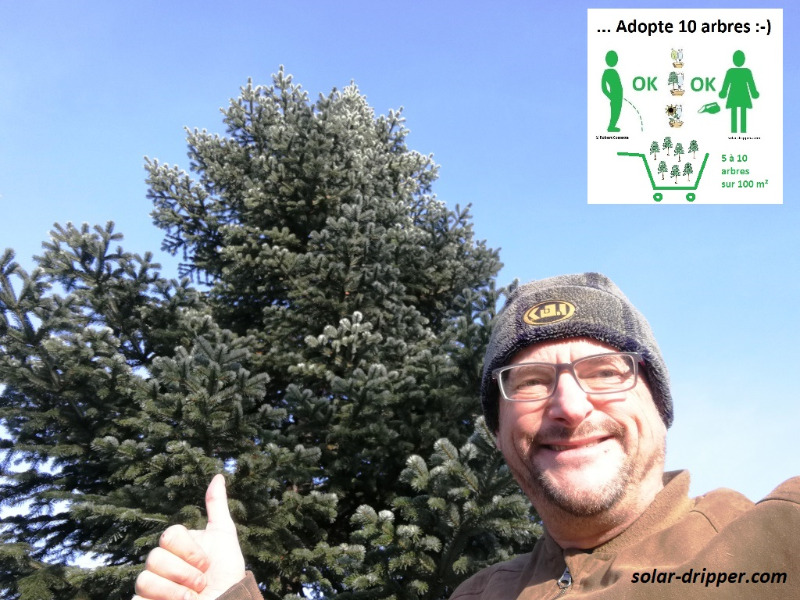 8-janvier-2020_b.jpg
(Filesize: 191KB)
8-janvier-2020_b.jpg
(Filesize: 191KB)
Please Log in to join the conversation.
You need to login to reply- Reese8209
-
Less
- Posts: 5
- Likes received: 2
Re: Reply: Human urine fertiliser as a business in Malawi.
Really interesting initiative, thanks for sharing with us. I didn't even know urine was this safe for trees, actually, always thought that it would end up doing more harm than good. Interesting read.
Please Log in to join the conversation.
You need to login to reply
I forgot to answer regarding medication.
It is also an important topic and possibly again an advantage for human urine compared to animal manure.
The use of antibiotics for breeding is much higher than human doses.
Often, all livestock receive the antibiotic, not just sick animals.
Basically human urine contains on average less than some farm manure.
The biodegradability in aerobic soil is better than in the water.
The answer is not perfect but I believe that this means of reducing the density and improving the degradation is OK.
Some studies have measured 100 to 1000 times less medical residues in human urine compared to farms manure.
Also, a study has verified the very low absorption by plants of trace of drugs. ( Uptake studies )
Ideally the urine to fertilize food should contain low levels of medical residues or be used for trees if there are serious fears.
But I don't have 100% of the answers.
Robert
It is also an important topic and possibly again an advantage for human urine compared to animal manure.
The use of antibiotics for breeding is much higher than human doses.
Often, all livestock receive the antibiotic, not just sick animals.
Basically human urine contains on average less than some farm manure.
The biodegradability in aerobic soil is better than in the water.
The answer is not perfect but I believe that this means of reducing the density and improving the degradation is OK.
Some studies have measured 100 to 1000 times less medical residues in human urine compared to farms manure.
Also, a study has verified the very low absorption by plants of trace of drugs. ( Uptake studies )
Ideally the urine to fertilize food should contain low levels of medical residues or be used for trees if there are serious fears.
But I don't have 100% of the answers.
Robert
Robert Cossette
solar-dripper.com
solar-dripper.com
Please Log in to join the conversation.
You need to login to reply
Dear Paresh
I chose conifers because they keep doing photosynthesis in autumn and winter.
Here in France, leafy trees lose their leaves in the fall and probably need less nitrogen from the urine.
My garden is very calm in winter.
My goal is to optimize the seasonal recovery of urine because I do not want to store urine for simplicity.
According to the WHO report that I consulted, urine can be used directly for our private gardens.
With the application of urine to the soil with the Solar-Dripper, possible pathogens are destroyed by aerobic microorganisms in the soil.
In addition, osmosis filtration of the root membrane only captures water and nutrients.
The result is pretty safe in my opinion and the fruits are excellent in taste which amuses my visitors a lot.
In addition, urine is odorless in production and its natural transformation in a balanced soil does not create any odor.
The valuation of urine for food plants seems pretty safe to me.
For ornamental plants or trees it is even less risky. I do not know all the diseases in the world but in my opinion it is much riskier to poop in a stream than to use urine in the vegetable patch.
Regarding the long-term effect on the groundwater, I believe that the groundwater quality has held up well for millions of years with the natural transformation of excrement by the soil.
Try this method with a non-food tree and you will already see the possible symbiosis gains.
Best Regards
Robert
Video in my garden:
www.facebook.com/watch/?v=38106195612572...=urine%20fr3%20alpes
solar-dripper.com/en/how-to-use-urine-fertilizer/ ( in the garden)
solar-dripper.com/comment-utiliser-urine-sous-les-arbres/ ( under the trees in french )
I chose conifers because they keep doing photosynthesis in autumn and winter.
Here in France, leafy trees lose their leaves in the fall and probably need less nitrogen from the urine.
My garden is very calm in winter.
My goal is to optimize the seasonal recovery of urine because I do not want to store urine for simplicity.
According to the WHO report that I consulted, urine can be used directly for our private gardens.
With the application of urine to the soil with the Solar-Dripper, possible pathogens are destroyed by aerobic microorganisms in the soil.
In addition, osmosis filtration of the root membrane only captures water and nutrients.
The result is pretty safe in my opinion and the fruits are excellent in taste which amuses my visitors a lot.
In addition, urine is odorless in production and its natural transformation in a balanced soil does not create any odor.
The valuation of urine for food plants seems pretty safe to me.
For ornamental plants or trees it is even less risky. I do not know all the diseases in the world but in my opinion it is much riskier to poop in a stream than to use urine in the vegetable patch.
Regarding the long-term effect on the groundwater, I believe that the groundwater quality has held up well for millions of years with the natural transformation of excrement by the soil.
Try this method with a non-food tree and you will already see the possible symbiosis gains.
Best Regards
Robert
Video in my garden:
www.facebook.com/watch/?v=38106195612572...=urine%20fr3%20alpes
solar-dripper.com/en/how-to-use-urine-fertilizer/ ( in the garden)
solar-dripper.com/comment-utiliser-urine-sous-les-arbres/ ( under the trees in french )
Robert Cossette
solar-dripper.com
solar-dripper.com
Attachments:
-
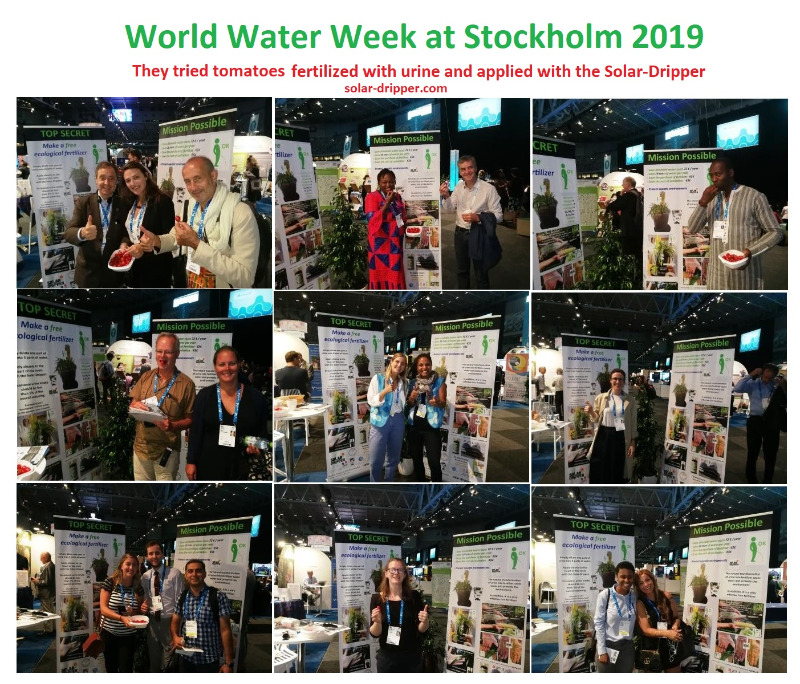 world-wate...2-08.jpg
(Filesize: 284KB)
world-wate...2-08.jpg
(Filesize: 284KB)
-
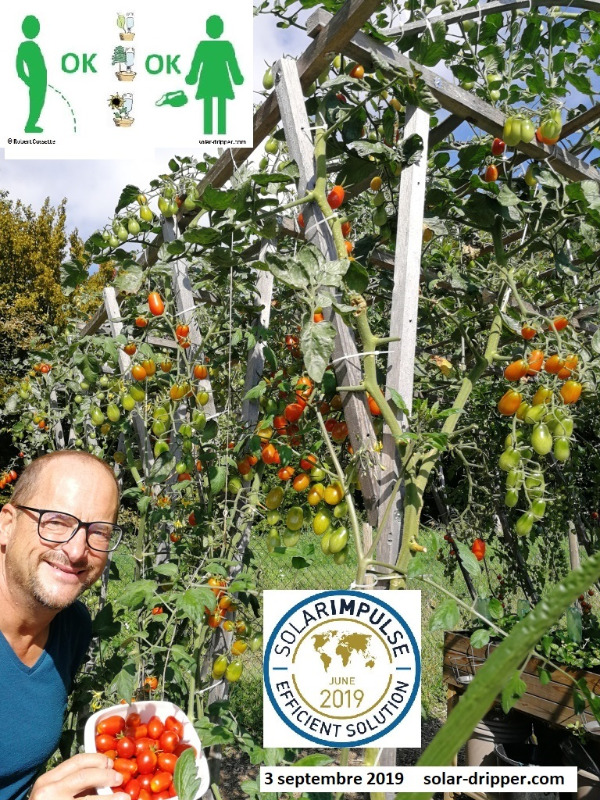 Solar-drip...2-08.jpg
(Filesize: 311KB)
Solar-drip...2-08.jpg
(Filesize: 311KB)
-
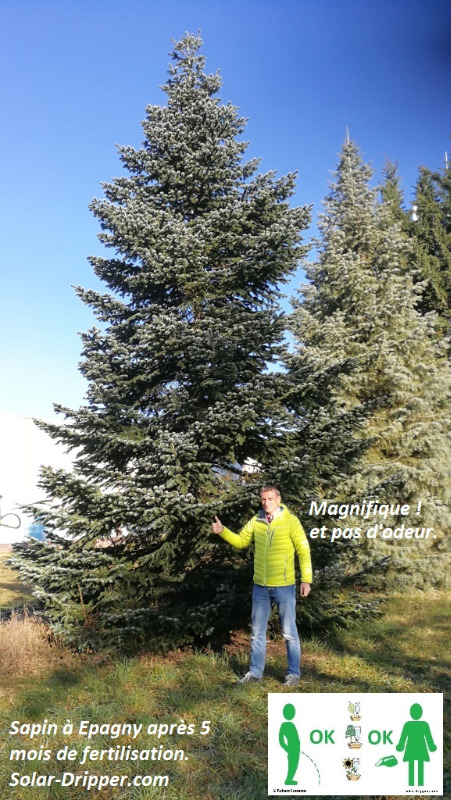 sapin-8-16...2020.jpg
(Filesize: 201KB)
sapin-8-16...2020.jpg
(Filesize: 201KB)
-
 vipee-unde...2-08.jpg
(Filesize: 193KB)
vipee-unde...2-08.jpg
(Filesize: 193KB)
-
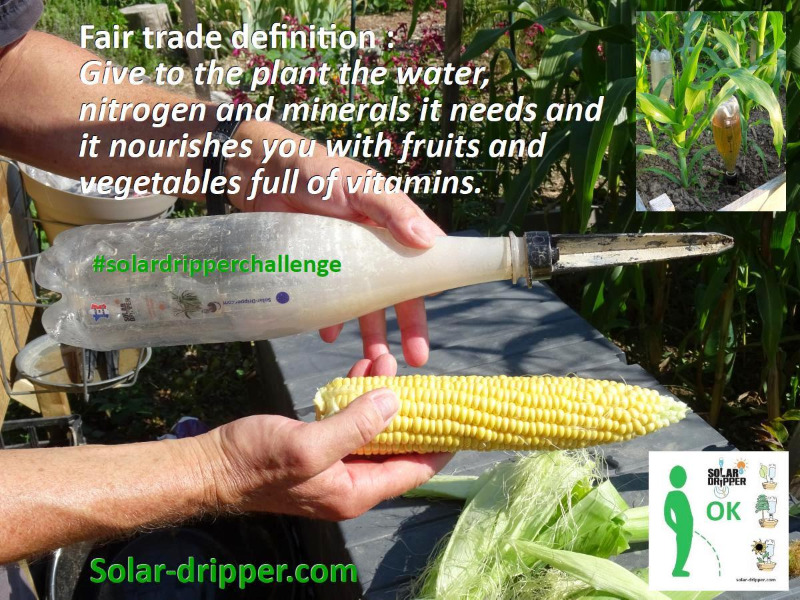 solardripp...2-08.jpg
(Filesize: 239KB)
solardripp...2-08.jpg
(Filesize: 239KB)
-
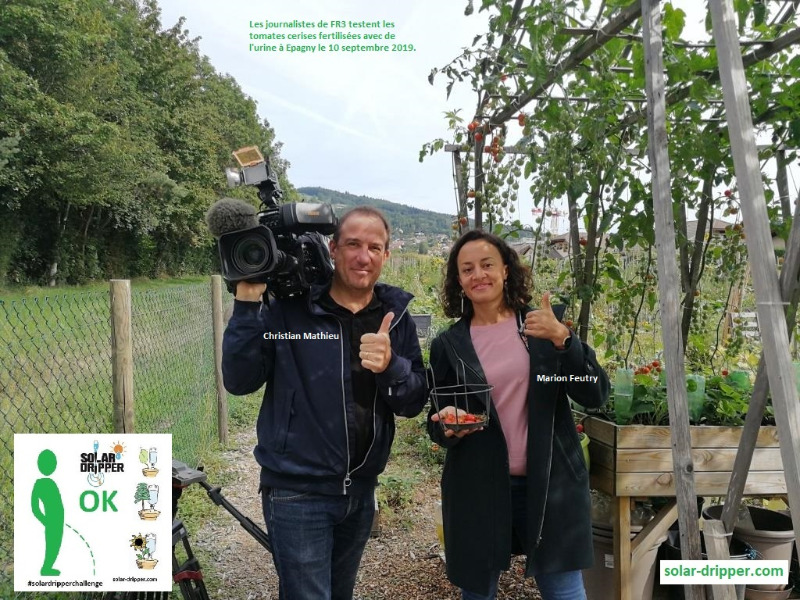 Journalist...2-08.jpg
(Filesize: 234KB)
Journalist...2-08.jpg
(Filesize: 234KB)
Please Log in to join the conversation.
You need to login to reply- paresh
-

- Moderator
- Budding WASH researcher, especially interested in governance, public policy, finance, politics and social justice. Architect, Urban & Regional planner by training, Ex. C-WAS, India.I am a patient person :)
Less- Posts: 383
- Karma: 7
- Likes received: 143
Dear Robert,
This is an excellent way of source separation of urine and faeces, especially where eco-san toilets are not a norm, the water table is deep and population sparse. The webpage does talk about other advantages including protection of the marine environment. Further, I assume that you chose conifers as they are not eaten, which makes it safer. Did you choose conifers over other types of trees deliberately?
I have a few other questions as well that may be of interest to others also
1. Do you store urine for some time before applying it? Is it safe to apply immediately if one is on medications?
2. What could be done with urine during the winters? or could it be applied at any time unless the ground is frozen?
3. I understand farmers can save on fertiliser costs. Are they adequate to motivate them for long term application, after the initial excitement has worn off?
4. How would a gardener/farmer know if they have applied more than desired? They may unknowingly pollute the groundwater.
paresh
This is an excellent way of source separation of urine and faeces, especially where eco-san toilets are not a norm, the water table is deep and population sparse. The webpage does talk about other advantages including protection of the marine environment. Further, I assume that you chose conifers as they are not eaten, which makes it safer. Did you choose conifers over other types of trees deliberately?
I have a few other questions as well that may be of interest to others also
1. Do you store urine for some time before applying it? Is it safe to apply immediately if one is on medications?
2. What could be done with urine during the winters? or could it be applied at any time unless the ground is frozen?
3. I understand farmers can save on fertiliser costs. Are they adequate to motivate them for long term application, after the initial excitement has worn off?
4. How would a gardener/farmer know if they have applied more than desired? They may unknowingly pollute the groundwater.
paresh
Paresh Chhajed-Picha
Moderator, SuSanA forum
Project Manager at ADCPS
Indian Institute of Technology - Bombay, India
Moderator, SuSanA forum
Project Manager at ADCPS
Indian Institute of Technology - Bombay, India
The following user(s) like this post: Robert74
Please Log in to join the conversation.
You need to login to reply
For five months we have been applying urine under conifers.
At a rate of 1 to 5 liters per m² per year the result is excellent. I checked with Renaud De Looze (author of a book on the use of urine) and the rate is OK.
No smell, greener trees and beautiful growth.
Only for V.I. Pee
This continuous application method makes it easy to recover the urine of a person with 100 m² of trees.
Web page in French : solar-dripper.com/comment-utiliser-urine-sous-les-arbres/
The benefits are > Water savings, + increased growth of trees with more CO2 absorption + protecting aquatic environments.
It costs 3 min per day.
At a rate of 1 to 5 liters per m² per year the result is excellent. I checked with Renaud De Looze (author of a book on the use of urine) and the rate is OK.
No smell, greener trees and beautiful growth.
Only for V.I. Pee
This continuous application method makes it easy to recover the urine of a person with 100 m² of trees.
Web page in French : solar-dripper.com/comment-utiliser-urine-sous-les-arbres/
The benefits are > Water savings, + increased growth of trees with more CO2 absorption + protecting aquatic environments.
It costs 3 min per day.
Robert Cossette
solar-dripper.com
solar-dripper.com
Attachments:
-
 vipee-unde...tree.jpg
(Filesize: 193KB)
vipee-unde...tree.jpg
(Filesize: 193KB)
-
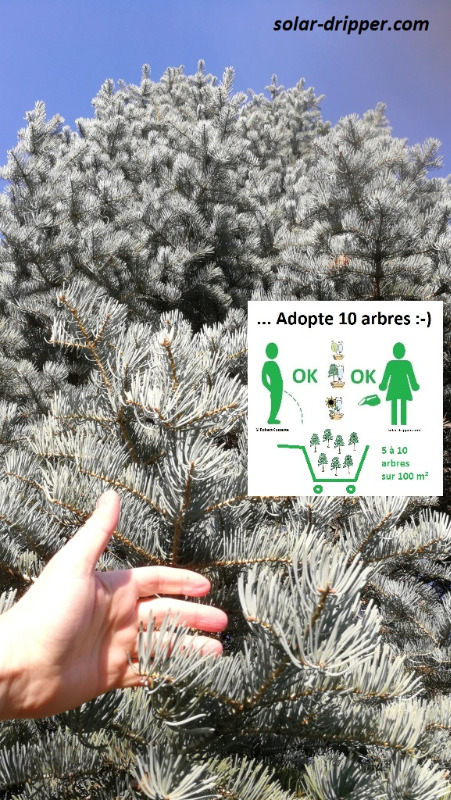 8-janvier-...1-09.jpg
(Filesize: 209KB)
8-janvier-...1-09.jpg
(Filesize: 209KB)
-
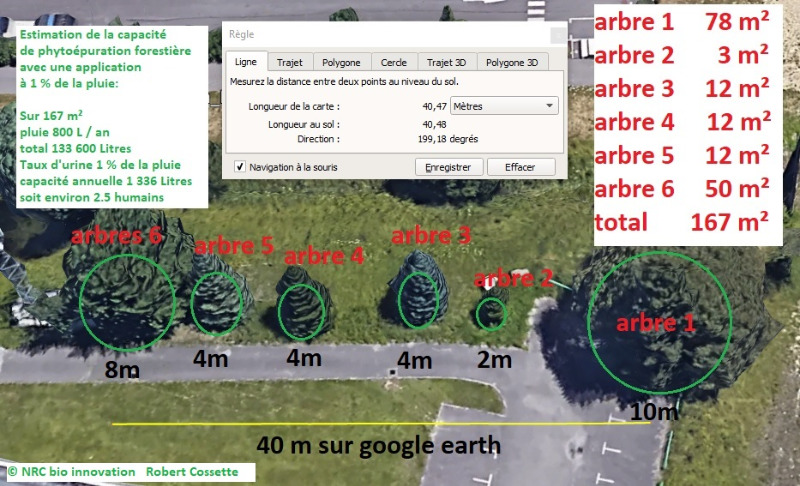 calcul-1-pluie.jpg
(Filesize: 168KB)
calcul-1-pluie.jpg
(Filesize: 168KB)
-
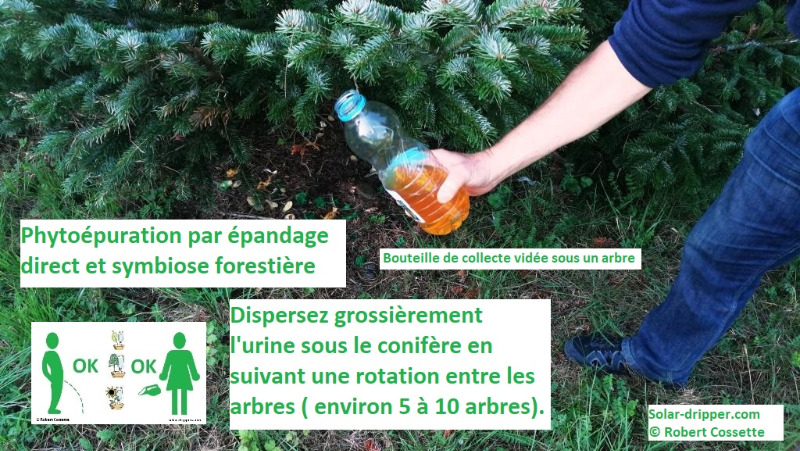 sapin-6.jpg
(Filesize: 214KB)
sapin-6.jpg
(Filesize: 214KB)
-
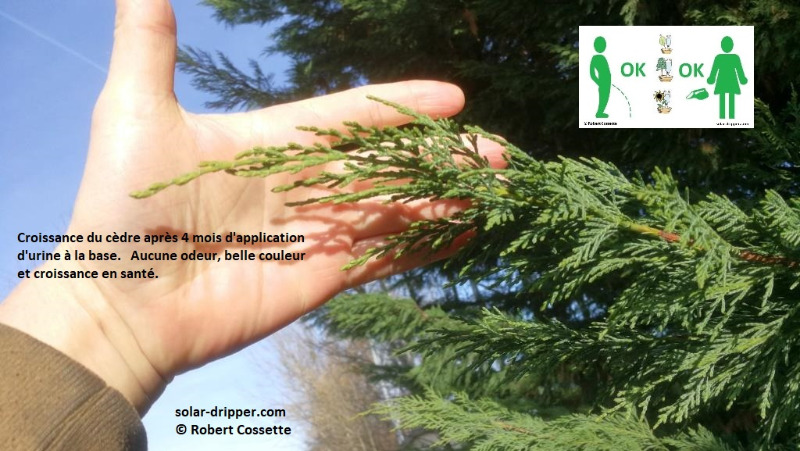 cedre-1.jpg
(Filesize: 153KB)
cedre-1.jpg
(Filesize: 153KB)
The following user(s) like this post: HarryTams
Please Log in to join the conversation.
You need to login to reply
Share this thread:
- Resource recovery
- Fertiliser, soil conditioner, production of crops
- Urine reuse or infiltration
- Reply: Human urine fertiliser as a business in Malawi.
Recently active users. Who else has been active?
Time to create page: 0.144 seconds







